Contract Law Case Study: Amadio
VerifiedAdded on 2020/05/16
|8
|1527
|78
AI Summary
This assignment delves into the landmark case of *Commercial Bank of Australia Ltd v Amadio*. Students analyze the legal principles of unconscionable dealing and the bank's liability towards the guarantor. Key aspects covered include the vulnerability of the Amadios, the bank's disclosure obligations, and the application of contract law doctrines.
Contribute Materials
Your contribution can guide someone’s learning journey. Share your
documents today.
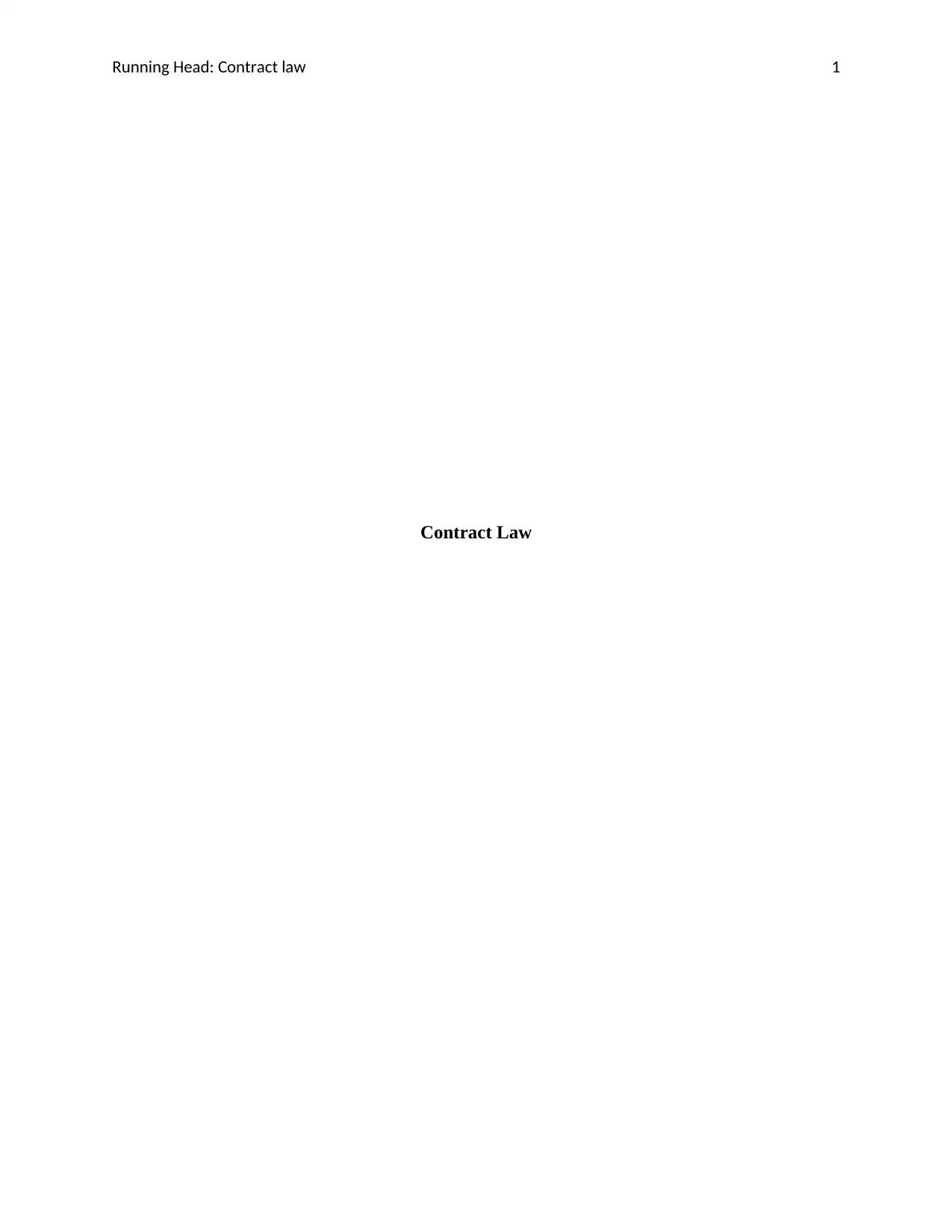
Running Head: Contract law 1
Contract Law
Contract Law
Secure Best Marks with AI Grader
Need help grading? Try our AI Grader for instant feedback on your assignments.
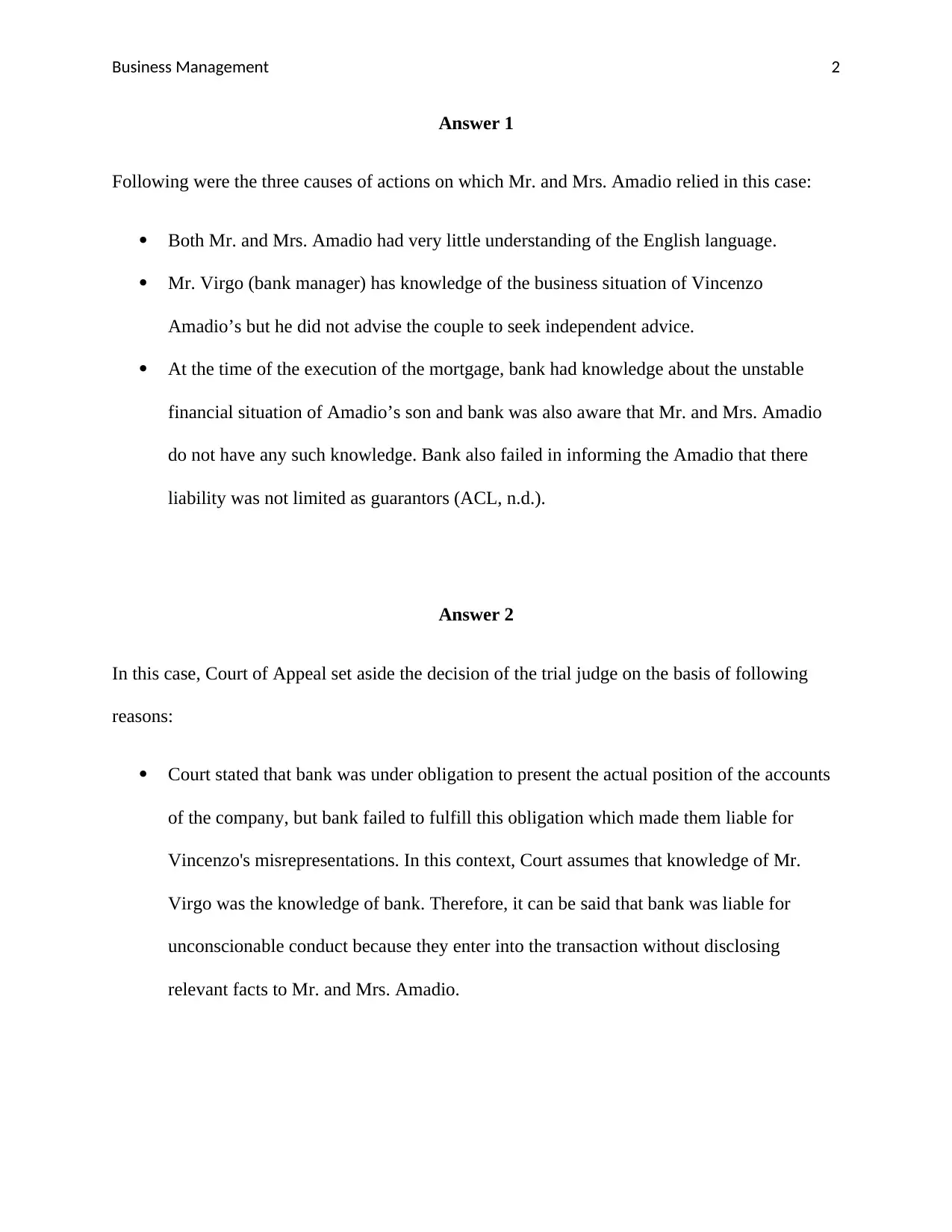
Business Management 2
Answer 1
Following were the three causes of actions on which Mr. and Mrs. Amadio relied in this case:
Both Mr. and Mrs. Amadio had very little understanding of the English language.
Mr. Virgo (bank manager) has knowledge of the business situation of Vincenzo
Amadio’s but he did not advise the couple to seek independent advice.
At the time of the execution of the mortgage, bank had knowledge about the unstable
financial situation of Amadio’s son and bank was also aware that Mr. and Mrs. Amadio
do not have any such knowledge. Bank also failed in informing the Amadio that there
liability was not limited as guarantors (ACL, n.d.).
Answer 2
In this case, Court of Appeal set aside the decision of the trial judge on the basis of following
reasons:
Court stated that bank was under obligation to present the actual position of the accounts
of the company, but bank failed to fulfill this obligation which made them liable for
Vincenzo's misrepresentations. In this context, Court assumes that knowledge of Mr.
Virgo was the knowledge of bank. Therefore, it can be said that bank was liable for
unconscionable conduct because they enter into the transaction without disclosing
relevant facts to Mr. and Mrs. Amadio.
Answer 1
Following were the three causes of actions on which Mr. and Mrs. Amadio relied in this case:
Both Mr. and Mrs. Amadio had very little understanding of the English language.
Mr. Virgo (bank manager) has knowledge of the business situation of Vincenzo
Amadio’s but he did not advise the couple to seek independent advice.
At the time of the execution of the mortgage, bank had knowledge about the unstable
financial situation of Amadio’s son and bank was also aware that Mr. and Mrs. Amadio
do not have any such knowledge. Bank also failed in informing the Amadio that there
liability was not limited as guarantors (ACL, n.d.).
Answer 2
In this case, Court of Appeal set aside the decision of the trial judge on the basis of following
reasons:
Court stated that bank was under obligation to present the actual position of the accounts
of the company, but bank failed to fulfill this obligation which made them liable for
Vincenzo's misrepresentations. In this context, Court assumes that knowledge of Mr.
Virgo was the knowledge of bank. Therefore, it can be said that bank was liable for
unconscionable conduct because they enter into the transaction without disclosing
relevant facts to Mr. and Mrs. Amadio.
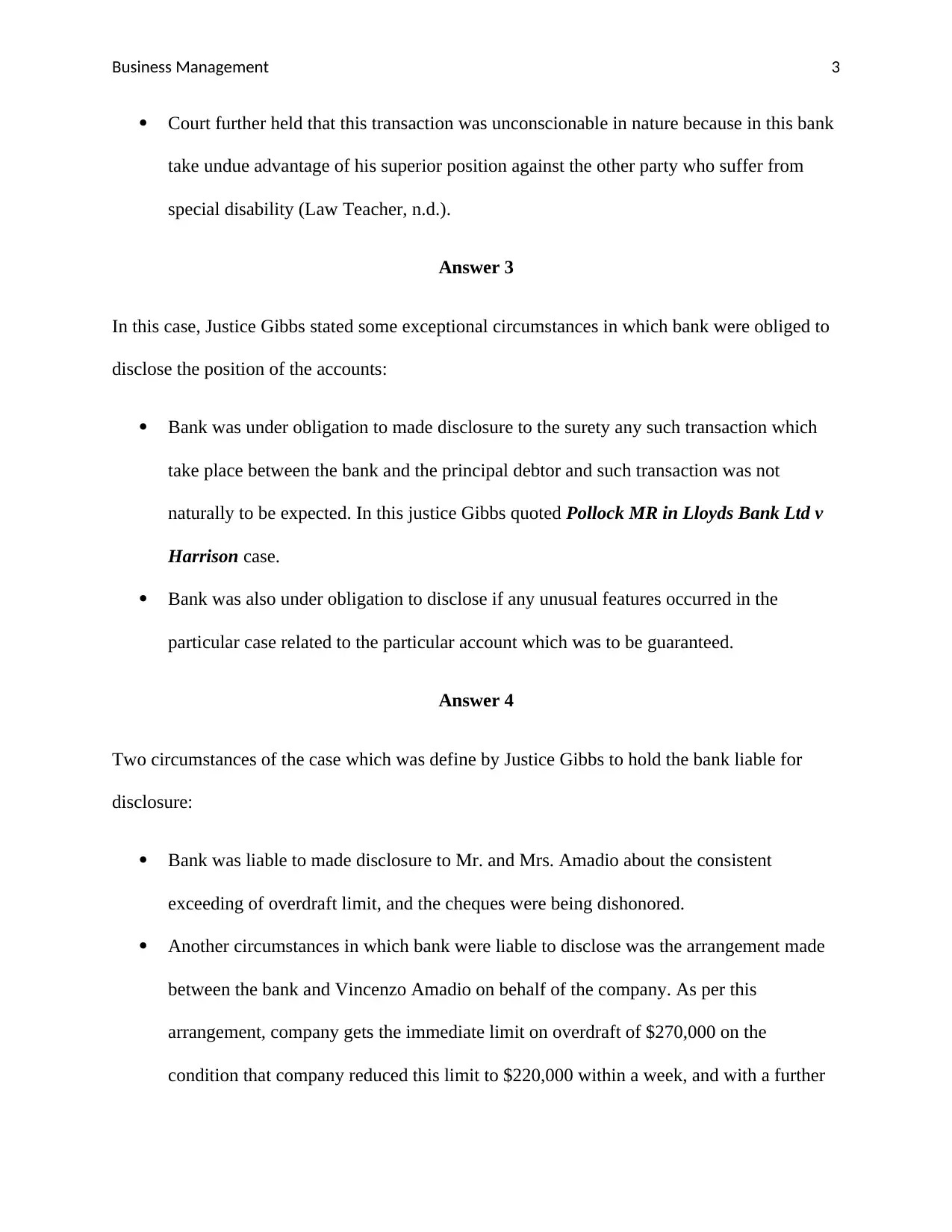
Business Management 3
Court further held that this transaction was unconscionable in nature because in this bank
take undue advantage of his superior position against the other party who suffer from
special disability (Law Teacher, n.d.).
Answer 3
In this case, Justice Gibbs stated some exceptional circumstances in which bank were obliged to
disclose the position of the accounts:
Bank was under obligation to made disclosure to the surety any such transaction which
take place between the bank and the principal debtor and such transaction was not
naturally to be expected. In this justice Gibbs quoted Pollock MR in Lloyds Bank Ltd v
Harrison case.
Bank was also under obligation to disclose if any unusual features occurred in the
particular case related to the particular account which was to be guaranteed.
Answer 4
Two circumstances of the case which was define by Justice Gibbs to hold the bank liable for
disclosure:
Bank was liable to made disclosure to Mr. and Mrs. Amadio about the consistent
exceeding of overdraft limit, and the cheques were being dishonored.
Another circumstances in which bank were liable to disclose was the arrangement made
between the bank and Vincenzo Amadio on behalf of the company. As per this
arrangement, company gets the immediate limit on overdraft of $270,000 on the
condition that company reduced this limit to $220,000 within a week, and with a further
Court further held that this transaction was unconscionable in nature because in this bank
take undue advantage of his superior position against the other party who suffer from
special disability (Law Teacher, n.d.).
Answer 3
In this case, Justice Gibbs stated some exceptional circumstances in which bank were obliged to
disclose the position of the accounts:
Bank was under obligation to made disclosure to the surety any such transaction which
take place between the bank and the principal debtor and such transaction was not
naturally to be expected. In this justice Gibbs quoted Pollock MR in Lloyds Bank Ltd v
Harrison case.
Bank was also under obligation to disclose if any unusual features occurred in the
particular case related to the particular account which was to be guaranteed.
Answer 4
Two circumstances of the case which was define by Justice Gibbs to hold the bank liable for
disclosure:
Bank was liable to made disclosure to Mr. and Mrs. Amadio about the consistent
exceeding of overdraft limit, and the cheques were being dishonored.
Another circumstances in which bank were liable to disclose was the arrangement made
between the bank and Vincenzo Amadio on behalf of the company. As per this
arrangement, company gets the immediate limit on overdraft of $270,000 on the
condition that company reduced this limit to $220,000 within a week, and with a further
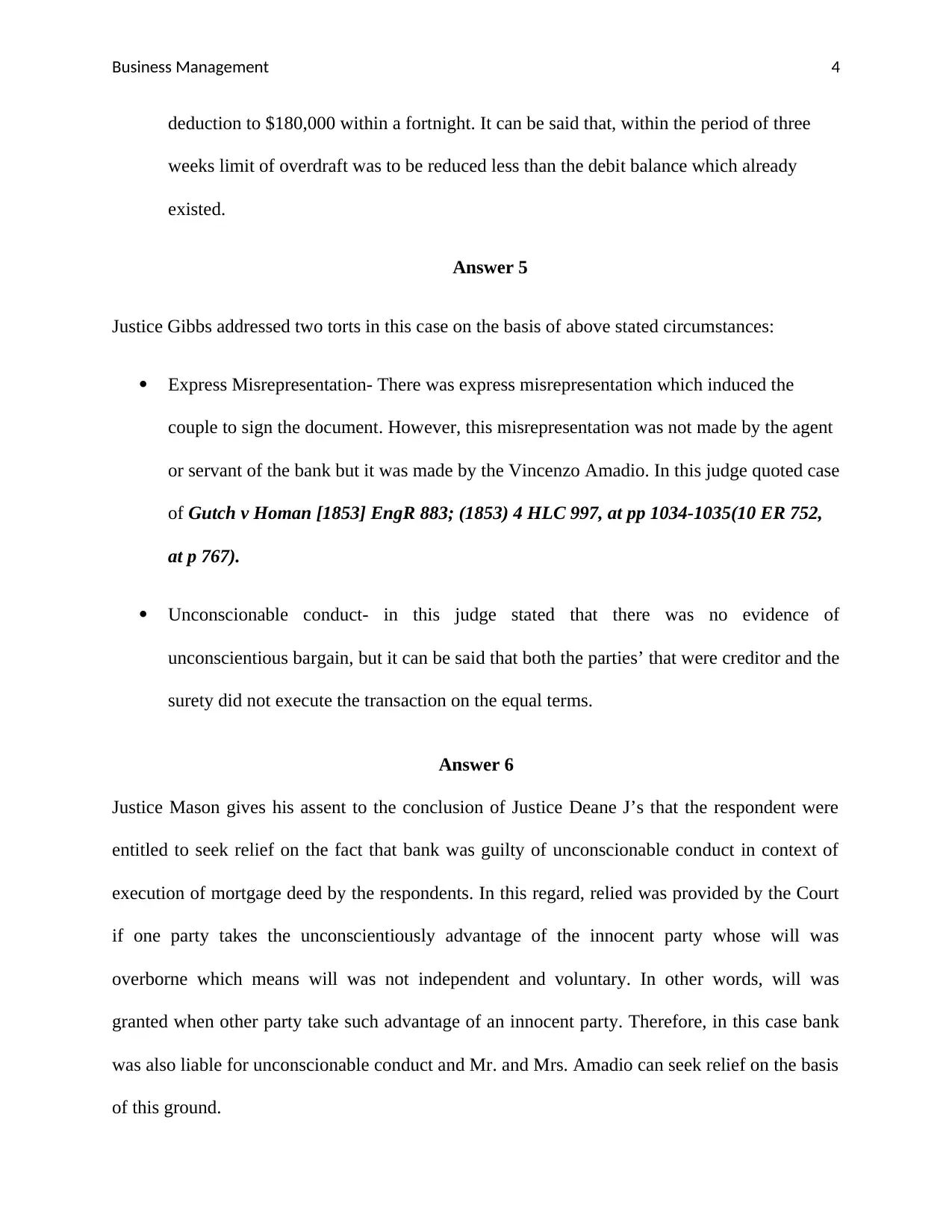
Business Management 4
deduction to $180,000 within a fortnight. It can be said that, within the period of three
weeks limit of overdraft was to be reduced less than the debit balance which already
existed.
Answer 5
Justice Gibbs addressed two torts in this case on the basis of above stated circumstances:
Express Misrepresentation- There was express misrepresentation which induced the
couple to sign the document. However, this misrepresentation was not made by the agent
or servant of the bank but it was made by the Vincenzo Amadio. In this judge quoted case
of Gutch v Homan [1853] EngR 883; (1853) 4 HLC 997, at pp 1034-1035(10 ER 752,
at p 767).
Unconscionable conduct- in this judge stated that there was no evidence of
unconscientious bargain, but it can be said that both the parties’ that were creditor and the
surety did not execute the transaction on the equal terms.
Answer 6
Justice Mason gives his assent to the conclusion of Justice Deane J’s that the respondent were
entitled to seek relief on the fact that bank was guilty of unconscionable conduct in context of
execution of mortgage deed by the respondents. In this regard, relied was provided by the Court
if one party takes the unconscientiously advantage of the innocent party whose will was
overborne which means will was not independent and voluntary. In other words, will was
granted when other party take such advantage of an innocent party. Therefore, in this case bank
was also liable for unconscionable conduct and Mr. and Mrs. Amadio can seek relief on the basis
of this ground.
deduction to $180,000 within a fortnight. It can be said that, within the period of three
weeks limit of overdraft was to be reduced less than the debit balance which already
existed.
Answer 5
Justice Gibbs addressed two torts in this case on the basis of above stated circumstances:
Express Misrepresentation- There was express misrepresentation which induced the
couple to sign the document. However, this misrepresentation was not made by the agent
or servant of the bank but it was made by the Vincenzo Amadio. In this judge quoted case
of Gutch v Homan [1853] EngR 883; (1853) 4 HLC 997, at pp 1034-1035(10 ER 752,
at p 767).
Unconscionable conduct- in this judge stated that there was no evidence of
unconscientious bargain, but it can be said that both the parties’ that were creditor and the
surety did not execute the transaction on the equal terms.
Answer 6
Justice Mason gives his assent to the conclusion of Justice Deane J’s that the respondent were
entitled to seek relief on the fact that bank was guilty of unconscionable conduct in context of
execution of mortgage deed by the respondents. In this regard, relied was provided by the Court
if one party takes the unconscientiously advantage of the innocent party whose will was
overborne which means will was not independent and voluntary. In other words, will was
granted when other party take such advantage of an innocent party. Therefore, in this case bank
was also liable for unconscionable conduct and Mr. and Mrs. Amadio can seek relief on the basis
of this ground.
Secure Best Marks with AI Grader
Need help grading? Try our AI Grader for instant feedback on your assignments.
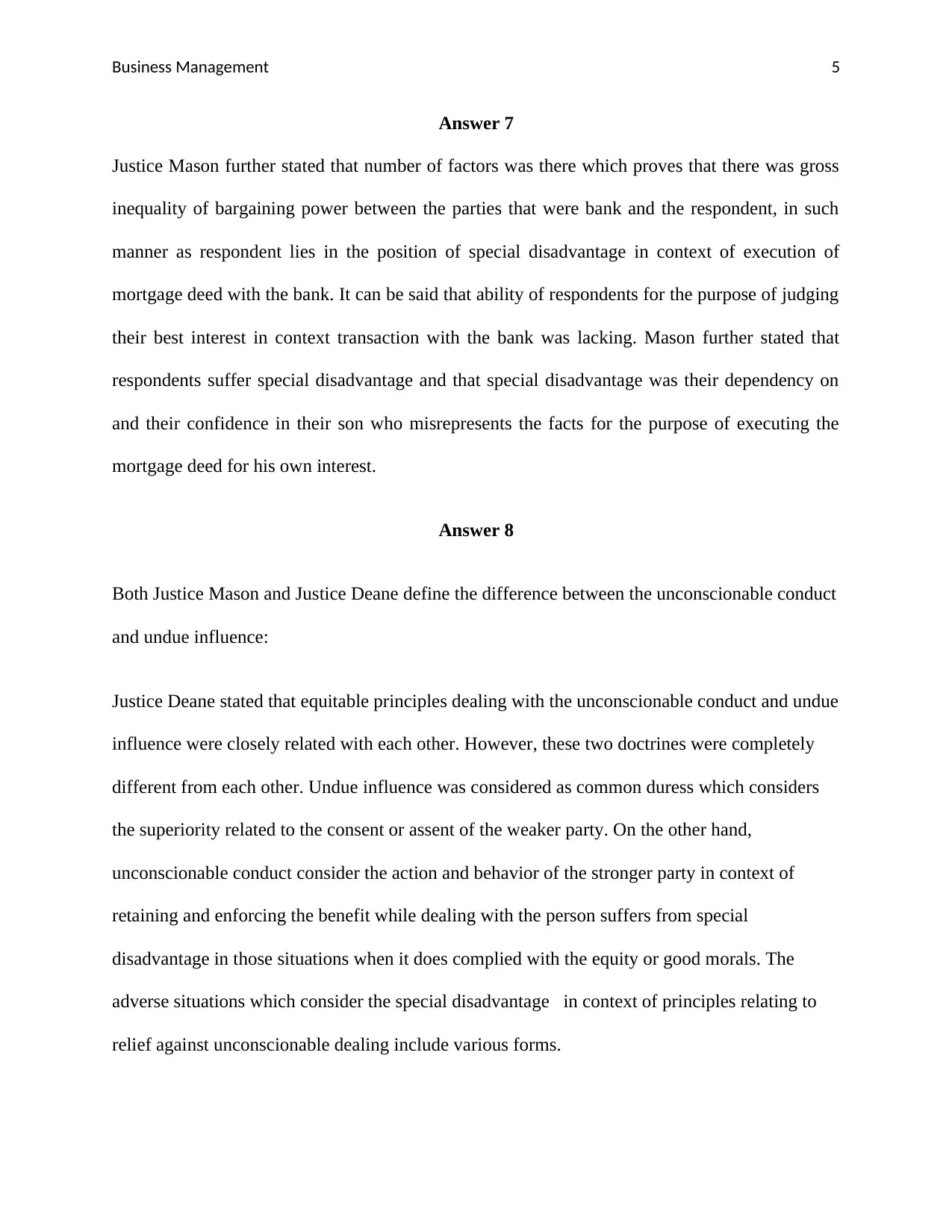
Business Management 5
Answer 7
Justice Mason further stated that number of factors was there which proves that there was gross
inequality of bargaining power between the parties that were bank and the respondent, in such
manner as respondent lies in the position of special disadvantage in context of execution of
mortgage deed with the bank. It can be said that ability of respondents for the purpose of judging
their best interest in context transaction with the bank was lacking. Mason further stated that
respondents suffer special disadvantage and that special disadvantage was their dependency on
and their confidence in their son who misrepresents the facts for the purpose of executing the
mortgage deed for his own interest.
Answer 8
Both Justice Mason and Justice Deane define the difference between the unconscionable conduct
and undue influence:
Justice Deane stated that equitable principles dealing with the unconscionable conduct and undue
influence were closely related with each other. However, these two doctrines were completely
different from each other. Undue influence was considered as common duress which considers
the superiority related to the consent or assent of the weaker party. On the other hand,
unconscionable conduct consider the action and behavior of the stronger party in context of
retaining and enforcing the benefit while dealing with the person suffers from special
disadvantage in those situations when it does complied with the equity or good morals. The
adverse situations which consider the special disadvantage in context of principles relating to
relief against unconscionable dealing include various forms.
Answer 7
Justice Mason further stated that number of factors was there which proves that there was gross
inequality of bargaining power between the parties that were bank and the respondent, in such
manner as respondent lies in the position of special disadvantage in context of execution of
mortgage deed with the bank. It can be said that ability of respondents for the purpose of judging
their best interest in context transaction with the bank was lacking. Mason further stated that
respondents suffer special disadvantage and that special disadvantage was their dependency on
and their confidence in their son who misrepresents the facts for the purpose of executing the
mortgage deed for his own interest.
Answer 8
Both Justice Mason and Justice Deane define the difference between the unconscionable conduct
and undue influence:
Justice Deane stated that equitable principles dealing with the unconscionable conduct and undue
influence were closely related with each other. However, these two doctrines were completely
different from each other. Undue influence was considered as common duress which considers
the superiority related to the consent or assent of the weaker party. On the other hand,
unconscionable conduct consider the action and behavior of the stronger party in context of
retaining and enforcing the benefit while dealing with the person suffers from special
disadvantage in those situations when it does complied with the equity or good morals. The
adverse situations which consider the special disadvantage in context of principles relating to
relief against unconscionable dealing include various forms.
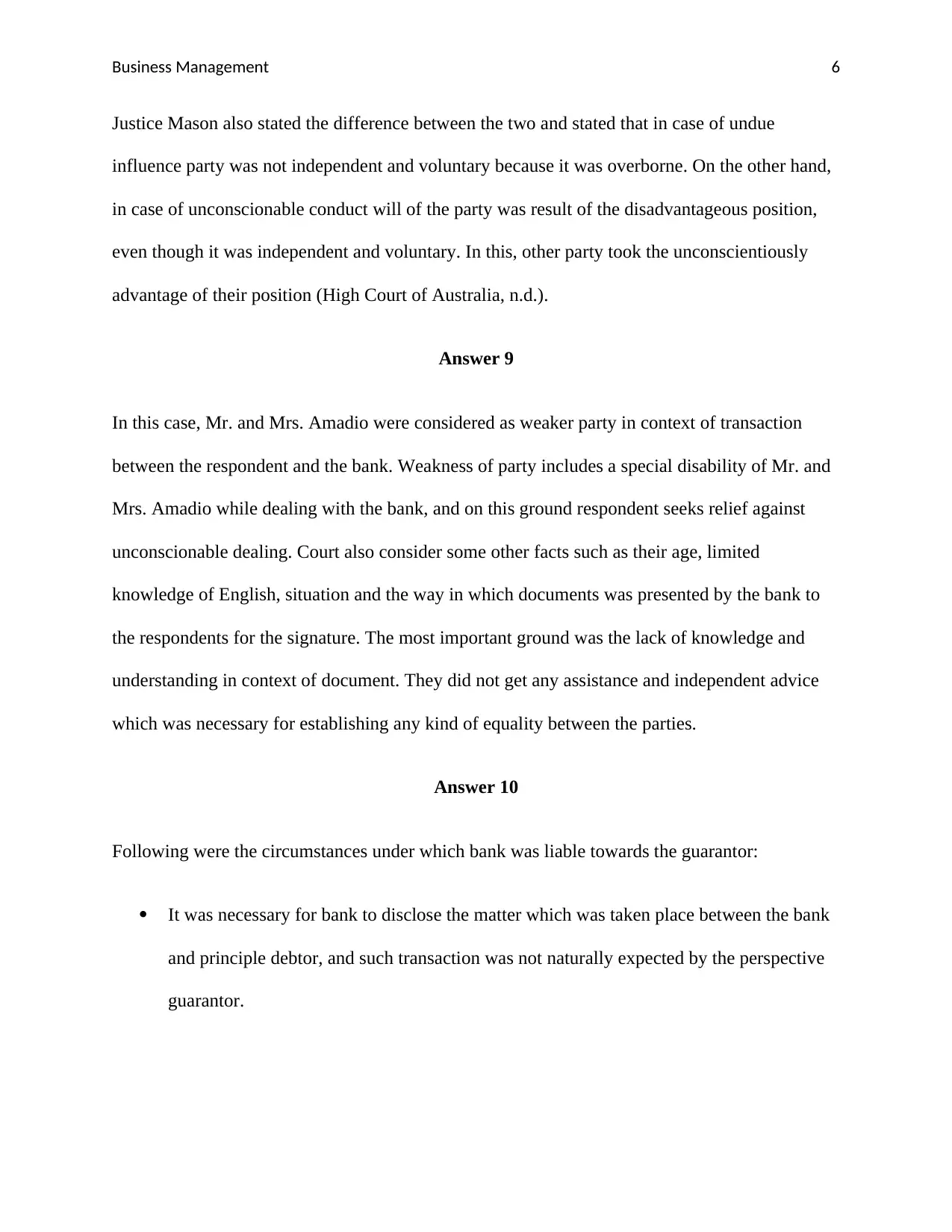
Business Management 6
Justice Mason also stated the difference between the two and stated that in case of undue
influence party was not independent and voluntary because it was overborne. On the other hand,
in case of unconscionable conduct will of the party was result of the disadvantageous position,
even though it was independent and voluntary. In this, other party took the unconscientiously
advantage of their position (High Court of Australia, n.d.).
Answer 9
In this case, Mr. and Mrs. Amadio were considered as weaker party in context of transaction
between the respondent and the bank. Weakness of party includes a special disability of Mr. and
Mrs. Amadio while dealing with the bank, and on this ground respondent seeks relief against
unconscionable dealing. Court also consider some other facts such as their age, limited
knowledge of English, situation and the way in which documents was presented by the bank to
the respondents for the signature. The most important ground was the lack of knowledge and
understanding in context of document. They did not get any assistance and independent advice
which was necessary for establishing any kind of equality between the parties.
Answer 10
Following were the circumstances under which bank was liable towards the guarantor:
It was necessary for bank to disclose the matter which was taken place between the bank
and principle debtor, and such transaction was not naturally expected by the perspective
guarantor.
Justice Mason also stated the difference between the two and stated that in case of undue
influence party was not independent and voluntary because it was overborne. On the other hand,
in case of unconscionable conduct will of the party was result of the disadvantageous position,
even though it was independent and voluntary. In this, other party took the unconscientiously
advantage of their position (High Court of Australia, n.d.).
Answer 9
In this case, Mr. and Mrs. Amadio were considered as weaker party in context of transaction
between the respondent and the bank. Weakness of party includes a special disability of Mr. and
Mrs. Amadio while dealing with the bank, and on this ground respondent seeks relief against
unconscionable dealing. Court also consider some other facts such as their age, limited
knowledge of English, situation and the way in which documents was presented by the bank to
the respondents for the signature. The most important ground was the lack of knowledge and
understanding in context of document. They did not get any assistance and independent advice
which was necessary for establishing any kind of equality between the parties.
Answer 10
Following were the circumstances under which bank was liable towards the guarantor:
It was necessary for bank to disclose the matter which was taken place between the bank
and principle debtor, and such transaction was not naturally expected by the perspective
guarantor.

Business Management 7
Bank was also liable towards the guarantor if the guarantor was short of non est factum,
which means he had been induced to provide guarantee on the basis of misrepresentation
or other impropriety by its customer or a third party.
Bank was also liable towards the guarantor if the guarantor was short of non est factum,
which means he had been induced to provide guarantee on the basis of misrepresentation
or other impropriety by its customer or a third party.
Paraphrase This Document
Need a fresh take? Get an instant paraphrase of this document with our AI Paraphraser
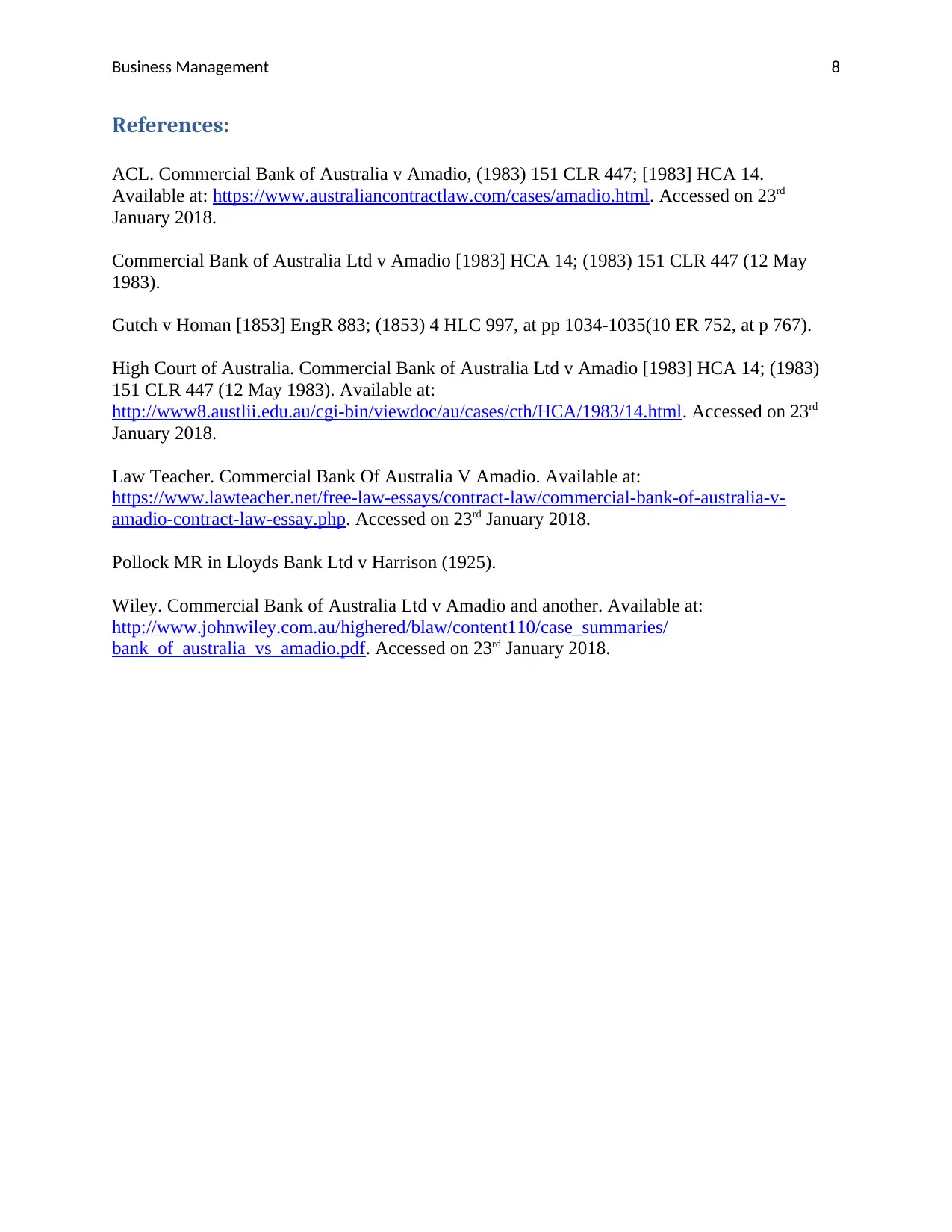
Business Management 8
References:
ACL. Commercial Bank of Australia v Amadio, (1983) 151 CLR 447; [1983] HCA 14.
Available at: https://www.australiancontractlaw.com/cases/amadio.html. Accessed on 23rd
January 2018.
Commercial Bank of Australia Ltd v Amadio [1983] HCA 14; (1983) 151 CLR 447 (12 May
1983).
Gutch v Homan [1853] EngR 883; (1853) 4 HLC 997, at pp 1034-1035(10 ER 752, at p 767).
High Court of Australia. Commercial Bank of Australia Ltd v Amadio [1983] HCA 14; (1983)
151 CLR 447 (12 May 1983). Available at:
http://www8.austlii.edu.au/cgi-bin/viewdoc/au/cases/cth/HCA/1983/14.html. Accessed on 23rd
January 2018.
Law Teacher. Commercial Bank Of Australia V Amadio. Available at:
https://www.lawteacher.net/free-law-essays/contract-law/commercial-bank-of-australia-v-
amadio-contract-law-essay.php. Accessed on 23rd January 2018.
Pollock MR in Lloyds Bank Ltd v Harrison (1925).
Wiley. Commercial Bank of Australia Ltd v Amadio and another. Available at:
http://www.johnwiley.com.au/highered/blaw/content110/case_summaries/
bank_of_australia_vs_amadio.pdf. Accessed on 23rd January 2018.
References:
ACL. Commercial Bank of Australia v Amadio, (1983) 151 CLR 447; [1983] HCA 14.
Available at: https://www.australiancontractlaw.com/cases/amadio.html. Accessed on 23rd
January 2018.
Commercial Bank of Australia Ltd v Amadio [1983] HCA 14; (1983) 151 CLR 447 (12 May
1983).
Gutch v Homan [1853] EngR 883; (1853) 4 HLC 997, at pp 1034-1035(10 ER 752, at p 767).
High Court of Australia. Commercial Bank of Australia Ltd v Amadio [1983] HCA 14; (1983)
151 CLR 447 (12 May 1983). Available at:
http://www8.austlii.edu.au/cgi-bin/viewdoc/au/cases/cth/HCA/1983/14.html. Accessed on 23rd
January 2018.
Law Teacher. Commercial Bank Of Australia V Amadio. Available at:
https://www.lawteacher.net/free-law-essays/contract-law/commercial-bank-of-australia-v-
amadio-contract-law-essay.php. Accessed on 23rd January 2018.
Pollock MR in Lloyds Bank Ltd v Harrison (1925).
Wiley. Commercial Bank of Australia Ltd v Amadio and another. Available at:
http://www.johnwiley.com.au/highered/blaw/content110/case_summaries/
bank_of_australia_vs_amadio.pdf. Accessed on 23rd January 2018.
1 out of 8
Related Documents
Your All-in-One AI-Powered Toolkit for Academic Success.
+13062052269
info@desklib.com
Available 24*7 on WhatsApp / Email
![[object Object]](/_next/static/media/star-bottom.7253800d.svg)
Unlock your academic potential
© 2024 | Zucol Services PVT LTD | All rights reserved.





